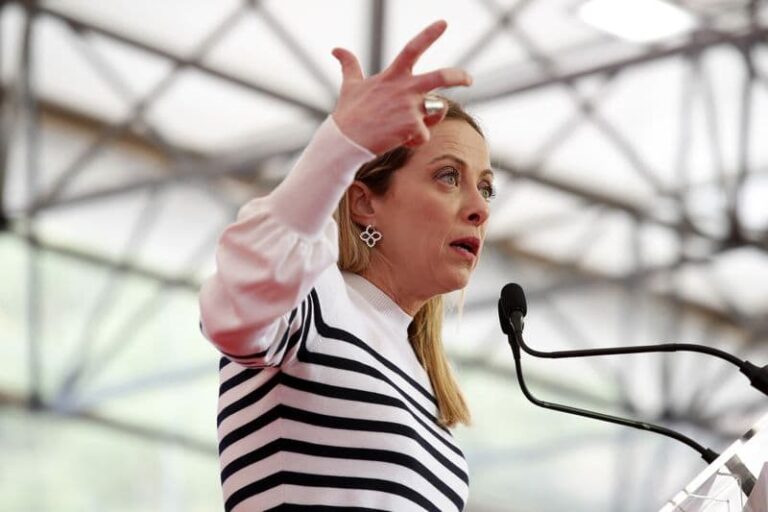That’s because Meloni’s Brothers of Italy was founded out of the ashes of the fascist National Alliance in 2012.
On May 17, polls put her party’s support at 23% of prospective voters, two points ahead of the center-left coalition led by Enrico Letta.
The erstwhile right-wing powerhouse, Matteo Salvini’s League, is polling at 16%, a collapse from a height of 30% in 2019.
If national elections took place right now, a potential alliance
— led by Meloni and including Salvini’s League and followers of disgraced tycoon Silvio Berlusconi
— would capture the most seats in the legislature and form a government.
The ascendancy of a neo-fascist party would panic international markets.
And Italy cannot at this time afford a return to the violent market volatility of the spring of 2018 when the League and the populist Five Star Movement emerged as the shock winners in national elections.
The eurozone’s third-largest economy’s debt is now around 150% of gross domestic product and its brief post-pandemic growth spurt
— following two decades of economic stagnation
— is already being tested by energy price spikes induced by the war in Ukraine.
Meloni is already seeking to broaden her appeal
— by softening her rhetoric.
On talk shows and in print, she’s started describing herself as center-right.
Few — if any — of her interviewers have challenged her on this revisionary self-portrait.
She’s scouting for academics and business leaders who will make her appear more politically mainstream, according to people who have been contacted by her team.
But drill down into her ideas and she has more in common with the illiberal democracies of Poland’s Law and Justice party and Hungary’s Viktor Orban.
Meloni’s success stems in part from being excluded.
Her Brothers of Italy party was the only major political organization not included in Draghi’s right-to-left pandemic era “government of unity.”
That’s given her a freedom to soak up protest votes among those affected by Italy’s growing economic inequality, and disillusioned by Brussels elites.
Draghi, the former European Central Bank president, was also appointed not elected prime minister.
That makes him a perfect foil for Meloni’s anti-establishment rhetoric.
Meloni, 45, accumulated political capital from the political kabuki that sought to shift Draghi to a more secure and permanent position of power
— the presidency
— in February.
A farcical and inconclusive vote ended with Sergio Mattarella, the sitting president, putting off his retirement for want of enough parliamentary support for the move.
None of the ruling coalition — including Salvini — came out looking good.
But the chaotic process also humbled “Super Mario.”
The prime minister is no longer the savior demigod he once was.
Meloni is now the only real political star untainted by the machinations of the sistema.
She’s learned lessons from the failure of the hardcore euroskepticism of Le Pen and Salvini
— indeed, she’d distanced herself from Le Pen, well before the French elections.
Meloni’s positioned herself as a new type of conservative, calling herself “a right wing” Tony Blair.
If that’s confusing, it’s probably intended to be. Many of Meloni’s positions are contradictory.
She knows Italy needs European Union funds, hence the softer anti-EU stance.
But she remains openly opposed to immigration and against European federalism.
An unmarried mother, she presents herself as a defender of Christian, traditional family values.
She was elected leader of the European Conservatives and Reformists Party in 2020, a grouping of far-right parties including Poland’s Law and Justice party.
— fluent in English and French
— was a speaker at the Republican CPAC convention, where she deepened her ties to Donald Trump’s contingent and railed against the “invasion” of the US by Mexican migrants, comparing it to Africans in Italy.
In Spain, she stood on stage among members of that country’s right-wing Vox party last year and described herself
— this time in fluent Spanish
— as “a mother and a woman” defending Europe from globalist elites.
She’s a striking persona in Italy’s culture of toxic machismo
— and, if she emerges victorious in an election, she would be the country’s first woman prime minister.
She’s winning support from unlikely quarters on that basis alone.
I met with an Italian female business leader last week who naturally leans left but still thinks Meloni is worth considering because she’d make history for her gender.
But don’t be fooled by the feminist gloss.
Meloni has argued “abortion is a defeat for society” and led opposition in Italy’s parliament to a law enshrining LGBTQ+ rights.
There’s plenty that can change between now and the end of Draghi’s mandate in spring 2023.
A rewriting of Italy’s electoral law to favor more proportional representation could greatly reduce Meloni’s chances.
She also needs the backing of Italy’s northern industrial elite and the entrepreneurial class.
That’s a tough task for a woman who grew up in a working-class district in Rome.
Salvini would also not appreciate her impinging ho his turf.
However, she is now the acceptable face of the far right and its post-fascist legacy
— and proof that illiberal democracy is reaching for the very heart of Europe.
More From This Writer and Others at Bloomberg Opinion:
Draghi Isn’t Italy’s President. That’s a Good Thing: Rachel Sanderson
Marine Le Pen’s Plan for Europe Would Be a Gift to Putin: Lionel Laurent
Poland Just Raised a Question the European Union Must Answer: Andreas Kluth
This column does not necessarily reflect the opinion of the editorial board or Bloomberg LP and its owners.

